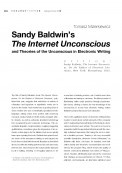Edward Balcerzan’s Multimedia Theory of Genres. Its Conditions and Perspective
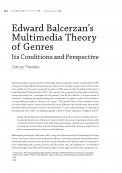
Edward Balcerzan announced his “multimedia theory of genres” project in September 1999, during the Twenty-Ninth Literary Theory Conference in Cieszyn. A paper that took the form of an outline for the project appeared in print in 2000, and was then included in Balcerzan’s book Literackość (Literariness) in 2013. (...)
Spoken-word poetry
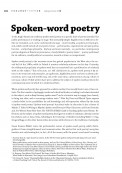
In the Anglo-American tradition spoken word poetry is a specific kind of poetry intended for public performance or reading on stage. This outwardly simple English term is difficult to define (or translate), as it can be understood two ways – more broadly, as spoken poetry in general, which would include all oral poetic forms – performative, experimental and jazz poetry, but also – and perhaps primarily – hip hop; and more narrowly – as a particular contemporary poetry subgenre of American provenance, closely linked to poetry slams[1] – poetry performed for an audience, usually without accessories, musical or dance accompaniment. (...)
Fan-Fiction
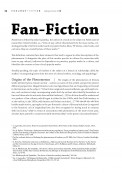
Fan fiction is defined by Lidia Gąsowska, the author of a book on the subject in Polish (and of many other related works), as a “form of pop culture disseminated via the mass media, consisting primarily of written works based on popular books, films, TV shows, comic books, and cartoons; they are created by fans of these works.”[1]
This definition contains three basic elements that tend to appear in other descriptions of the phenomenon. (...)
What Do We Do with Poetics? – A Student’s Perspective
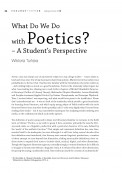
Poetics class was always one of my favorite subjects in my college studies – I must admit it, loud and clear, since few of my classmates shared my opinion. My interest in that subject was probably due to the fact that I had become familiar with the foundations of poetics earlier on – and nothing helps as much as a good foundation. (...)
Dycio Generator. On the Variational Tendencies of Eugeniusz Tkaczyszyn-Dycki’s Poetry
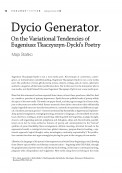
Eugeniusz Tkaczyszyn-Dycki is not a new media poet. All attempts at conversion, convergence, or interpretation notwithstanding, Eugeniusz Tkaczyszyn-Dycki is not a new media poet. The aesthetics of error, glitch poetry, noises, clusters, strings, and, of course, cybernetic aesthetic categories, all find some justification here. (...)
From the XCOM Archive: How to defeat the Aliens and Stay Sane
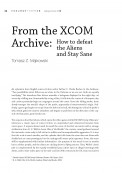
An aphorism from English science-fiction writer Arthur C. Clarke flashes in the darkness: “Two possibilities exist: Either we are alone in the Universe or we are not. Both are equally terrifying.” The tremulous blue letters resemble a hologram displayed in the night sky, cut across by a falling star. (...)
Facetiae on Facebook – A Case Study
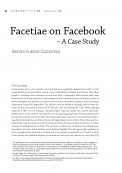
On Facetiae
Social media such as the popular site Facebook were originally designed primarily to help people find their friends online, stay in contact with them, and make new friends. They allow people to exchange short messages in real time with a community that includes both close friends and casual acquaintances, concerning events of a private (or even intimate) nature, as well as thoughts and opinions on current events in the sociopolitical sphere, and to exchange interesting content via hyperlinks. (...)
Poetics in the Expanded Field. Textual, Visual, Digital…
Barrett Watten
We publish Polish translation of Barrett Watten’s Poetics in the Expanded Field. Textual, Visual, Digital… (New Media Poetics: Contexts, Technotexts, and Theories ed. Adelaide Morris and Thomas Swiss, The MIT Press, Cambridge, Massachusetts and London, England, 2006, pp. (...)
Poetics in Action. Time and Code in the Poetry of John Cayley and the Poets of Rozdzielczość Chleba
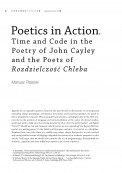
Appeals for an expanded poetics, heard in the past decade in discussions of contemporary textuality, always promising a renaissance for poetics and its preoccupations, are quick to find a sympathetic response. Who among literary scholars, a privileged crew in the 20th century due to the position of language and textual problems at the centre of cultural studies, would not wish to hold onto that strong hand in the 21st, after the performative[1] and digital “turns”? (...)






